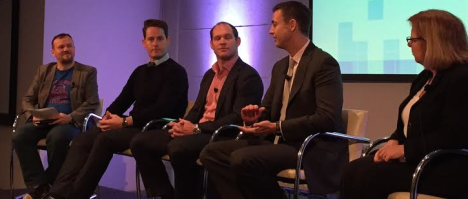Foxtel considers no contract option after driving ‘enormous growth’ in first quarter

The panel (l-r): Tim Burrowes, Mumbrella (moderator); Tristan Masters, Standard Media Index; Dan Sinfield, Carat; Ed Smith, Foxtel; Felicity Emmett, ANZ
Foxtel’s marketing boss Ed Smith has said the subscription television company may implement no contract options to encourage customers nervous of making a long-term commitment to the platform.
During Mumbrella’s Spends & Trends breakfast in Sydney, Smith was asked how the forthcoming Federal Budget might affect him as a marketer. He said: “Rather than thinking what I want to see in the budget, it’s a case of after seeing the budget, I’m thinking about what we do as a result – and how do we close out the quarter strongly?”
After hearing a relatively downbeat presentation from ANZ’s co-head of Australian Economics Felicity Emmett, Smith said: “I’m thinking about a no contract period where people who are nervous to sign up to a 12 month or 24 month plan come on board with confidence.”


So Ed Smith criticises foreign companies for avoiding tax in Australia? Hmm, so not at all like his parent company, News, which pays virtually no tax on its profit-rich British newspapers.
What so if you listen to your customers, it actually helps your business more than trying to shaft them at every opportunity? Who’d a thunk it? 😛
At last the penny has dropped, Foxtel! I would never sign up to a contract with them, but would definitely join up on a no-contract basis.
Contracts suck. I don’t sign them and I wont sign them. Foxtel whinging about tax? You are kidding me? Isn’t Rupert one of the biggest tax swervers on earth? Far out?!
had foxtel for the football and not that afl nrl pretend football rubbish, it was ok til my contract went up from 60 to 84 no letters even the douc on the phones didn’t tell me..only reason I cancelled it was the guy trying to make keep foxtel pushed me over the edge I had all the content except movies but sports is to much nrl and repeats..you can watch anything online now just set up the pc in your lounge room and boom..foxtel is a rip off but we fools pay for it because aus tv is crap and garbage its HD quality is poor, so many commercials and media is just an afl driven corr**uptd piece ..I would rather go pick oranges then watch aus tv